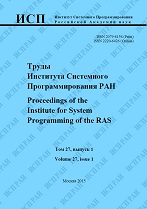|
Pure compiled execution as a programming paradigm
A. V. Stolyarov, O. G. Frantsuzov, A. S. Anikina
Lomonosov Moscow State University
Abstract:
Interpreted execution of computer programs, its capabilities and advantages is well-covered in the computer science literature. Its key feature is reflection: the ability to access and modify the source code at run time. At the same time, interpreted execution has its shortcomings: lower performance; higher code fragility caused by the possibility to change code during run time; more complicated static analysis; runtime-tied ecosystems. And in some cases like embedded systems, runtimes and interpreted code are impractical or impossible, and compiled code with zero dependencies is the only option. Pure compiled execution can be treated as a paradigm directly opposite to reflection-powered interpretation. If the primary trait of interpreted execution is reflection, then pure compilation should cleanly separate development time and run time. This implies no part of translator being available during run time, no requirements for runtime libraries availability, and, finally, no dependence on the implementation details like variable names. While interpretation is wildly popular, compiled execution can be a conscious choice not only for low-level applications, but other cases as well. The dichotomy between low-level languages and expressive reflection-enabled language is a false one. It should be possible to create an expressive purely compiled programming language, and such a language might be equally suitable both for system programming and application development.
Keywords:
programming paradigm, compilation, interpretation, reflection.
Citation:
A. V. Stolyarov, O. G. Frantsuzov, A. S. Anikina, “Pure compiled execution as a programming paradigm”, Proceedings of ISP RAS, 30:2 (2018), 7–24
Linking options:
https://www.mathnet.ru/eng/tisp306 https://www.mathnet.ru/eng/tisp/v30/i2/p7
|

| Statistics & downloads: |
| Abstract page: | 220 | | Full-text PDF : | 215 | | References: | 31 |
|




 Contact us:
Contact us: Terms of Use
Terms of Use
 Registration to the website
Registration to the website Logotypes
Logotypes







 Citation in format
Citation in format 